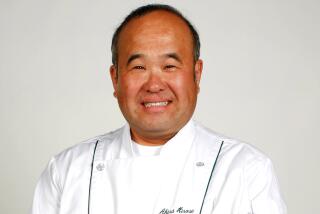John Aiso, Prominent Nisei and Jurist, Dies After Mugger’s Attack
- Share via
It was a bone-chilling and windy December afternoon, and the elderly man was pumping gas into his car at the mini-market gas station on Hollywood Boulevard when another, younger man walked up.
He was tall--taller than the old man--and described by witnesses as looking like a “street person.” He made a grab for the old man’s wallet, and the man turned, to protect his money.
The tall man pushed. The old man fell. He struck his head on the asphalt when he fell--struck it hard. The transient-looking fellow ran off, empty-handed.
Two-and-a-half weeks later, in a hospital in Burbank, the city where he was born, 78-year-old John F. Aiso died.
Whoever the assailant was--and police have no suspects--he could not have known that the man he shoved to the cold asphalt of an Arco service station was a renowned member of the Japanese-American community, the highest-ranking Nisei in the U.S. Armed Forces during World War II and the first Nisei judge in the United States, advancing from the Municipal Court bench to the State Court of Appeals.
Dies of Injuries
Aiso, a first-generation Japanese-American, died Tuesday at St. Joseph Medical Center in Burbank from the head injury he suffered in the Dec. 13 attack.
The crude death--after such a distinguished career--sent shock waves through his relatives, friends and long-time associates.
“It’s bizarre that a man of his position would die like that,” said Warren Christopher, the senior partner at O’Melveny & Myers, where Aiso served for 10 years as special counsel after retiring from the bench in 1973, helping to establish the prominent law firm’s Pacific Rim expansion.
Although he attended two East Coast schools, and practiced law briefly in New York, it was Los Angeles where he began--and Los Angeles where he came back to.
A Hollywood High School standout, Aiso first attracted national attention in 1925 by winning the school’s oratorical contest on the U.S. Constitution, then withdrawing from the state finals to coach his high school colleague, second-place winner Herbert Wenig, to a national championship in Washington.
Pattern for His Life
It was a gesture that was a pattern for his life. Christopher, who remembers Aiso’s sense of humor, especially recalled his modesty and lack of self-importance: “There was never a question from a young lawyer that was too small or too trivial for him.” Aiso went on to graduate from Brown University and Harvard Law School, before establishing a successful law practice in New York. But with U.S. entrance into World War II in December, 1941, Aiso enlisted.
Within three years he had advanced from an Army private to lieutenant colonel, and during the war, served as Military Intelligence Service officer at Ft. Snelling, Minn.
“He saved many lives by being able to know what the Japanese army was doing,” said his surviving brother, Daniel.
After the war, he served as a Superior Court Commissioner until 1952, when he was appointed a Los Angeles Municipal Court judge--the first Nisei to hold a U.S. judicial post.
In 1957 he was elevated to Superior Court judge, and in 1968, then-Gov. Reagan promoted him to the 2nd District Court of Appeals.
Ability to Listen
“In the courts he was remembered for his solid opinions and his ability to listen. He was quiet but firm, the type of judge you would model yourself after,” said Justice Lester W. Roth, 92, a colleague from the Court of Appeals, where Aiso served for four years.
After he retired from the bench in 1973, he joined O’Melveny & Myers.
“He was very important culturally,” said Christopher. “He helped us understand the kind of advice and information that our Japanese clients would request from us.” After retiring from law practice in 1983, Aiso dedicated most of his efforts to St. Mary’s Episcopal Church.
“He was a very critical listener. A lot of times I would find myself preparing the sermons just for him,” said St. Mary’s pastor, the Rev. John Akiyoshi.
Aiso is survived by his wife, Sumy, his daughter, Ruth, and his son, John Jr. Services will be private.
For its part, Arco is offering $25,000 for any information leading to the arrest and conviction of Aiso’s assailant, whom police describe as a black man, age 30 to 35.
Arco plans to post billboard signs with the reward offer outside the gas station, in place of its usual Super Sundae advertisements.
“He was very prominent in the Nisei community,” said Daniel Aiso. “His death is a waste of a good life.”
More to Read
Sign up for Essential California
The most important California stories and recommendations in your inbox every morning.
You may occasionally receive promotional content from the Los Angeles Times.













